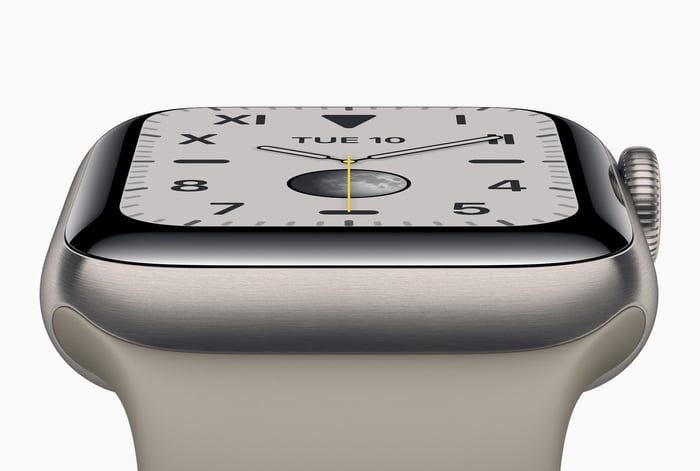Apple (AAPL -0.57%) just wrapped up its annual iPhone event, unveiling the latest flagship handsets that will lead the lineup over the next year. Tellingly, the company kicked off the festivities by detailing some of the services announced earlier this year. Apple has been intensely focused on building its services business over the past few years, hoping to divert investor attention away from declining iPhone unit sales.
Here's everything you need to know.
$5 per month each for Apple Arcade and Apple TV+
Apple finally provided more details regarding pricing and availability for Apple Arcade, its subscription-gaming service, and Apple TV+, its video-streaming service.

Apple TV+. Image source: Apple.
In line with the rumors, Apple Arcade will indeed be priced at $5 per month, which will give subscribers access to a growing catalog of exclusive games. There will initially be a little over 100 titles in the library, with more games added every month. The service will launch later this month on Sept. 19, and Apple is offering a one-month free trial to get people onboard.
Apple TV+ will launch on Nov. 1, and the company shocked investors with aggressive pricing. The service will also cost just $5 per month, much cheaper than the $10 per month that was expected. On top of that, Apple is throwing in a free year of service with the purchase of a new device.
A new entry-level iPad
The first hardware announcement was the 7th-generation iPad, which will become Apple's new entry-level tablet. The company is modestly increasing the display size to 10.2 inches, as well as incrementally bumping up other specs. The device uses the same A10 Fusion processor as the outgoing model and carries the same price of $329.
There were no other iPad-related updates.
Apple Watch Series 5 is always on
The big news for Apple Watch Series 5 is an always-on Retina display. The company says the feature does not hurt battery life, which is unchanged at 18 hours. The display is capable of dynamically adjusting its refresh rate, which helps improve power efficiency. The smartwatch is also getting a built-in compass, and Apple is introducing new case finishes.

Apple Watch Series 5. Image source: Apple.
The Cupertino tech giant is bringing ceramic back to the mix, in addition to aluminum and stainless steel, and adding titanium as an option. Pricing is unchanged, with GPS models starting at $400 and shipping on Sept. 20. Adding cellular connectivity bumps pricing up by $100.
Apple is also keeping the Apple Watch Series 3 around for another cycle, cutting the price from $279 to $199.
iPhone goes Pro
The successor to the iPhone XR is the iPhone 11. Apple is putting a dual-camera system into the iPhone 11, which combines a wide lens and ultrawide lens in order to let users capture much larger photos and videos. The color options have been tweaked a little bit, but iPhone 11 looks just like the XR that it's replacing. It's clear that Apple is prioritizing camera improvements, adding a slew of other spec bumps to both front-facing and rear-facing camera systems.

iPhone 11. Image source: Apple.
The flagship iPhone this year is the iPhone 11 Pro, which is the first time that the company has applied the "Pro" moniker to an iPhone. To justify that nomenclature, Apple says it's using similar display technology -- extended dynamic range -- to what's found in the forthcoming Pro Display XDR, in addition to adding a new triple-camera system that uses wide, ultrawide, and telephoto lenses.

iPhone 11 Pro. Image source: Apple.
Battery life is getting a substantial upgrade, with iPhone 11 Pro's battery expected to last four more hours than last year's iPhone XS. The larger iPhone 11 Pro Max will get five more hours of battery life compared to the previous iPhone XS Max.
The device gets a new textured finish and Apple is adding a dark green color option, which will join black, silver, and gold. All of the new iPhones will be powered by a new A13 Bionic chip, a beast of a processor that will maintain Apple's technological lead.
In terms of pricing, iPhone 11 will start at $700, cheaper than the $750 that the XR launched at a year ago. The iPhone 11 Pro and Pro Max are not getting price cuts and will still sell for the same $1,000 and $1,100, respectively.





